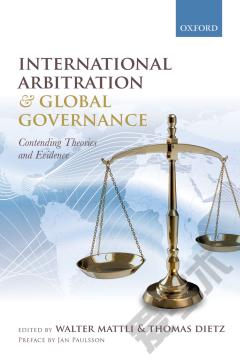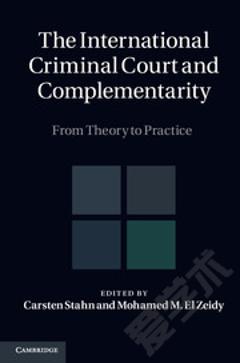International Arbitration and Global Governance —— Contending Theories and Evidence
----- 国际仲裁与全球治理:竞争理论与证据
Most literature on international arbitration is practice-oriented, technical, and promotional. It is by arbitrators and largely for arbitrators and their clients. Outside analyses by non-participants are still very rare. This book boldly steps away from this tradition of scholarship to reflect analytically on international arbitration as a form of global governance. It thus contributes to a rapidly growing literature that describes the profound economic, legal, and political transformation in which key governance functions are increasingly exercised by a new constellation that include actors other than national public authorities. The book brings together leading scholars from law and the social sciences to assess and critically reflect on the significance and implications of international arbitration as a new locus of global private authority. The views predictably diverge. Some see the evolution of these private courts positively as a significant element of an emerging transnational private legal system that gradually evolves according to the needs of market actors without much state interference. Others fear that private courts allow transnational actors to circumvent state regulation and create an illegitimate judicial system that is driven by powerful transnational companies at the expense of collective public interests. Still others accept that these contrasting views serve as useful starting points of an analysis but are too simplistic to adequately understand the complex governance structures that international arbitration courts have been developing over the last two decades. In sum, this book offers a wide-ranging and up-to-date analytical overview of arguments in a vigorous nascent interdisciplinary debate about arbitration courts and their exercise of private governance power in the transnational realm. This debate is generating fascinating new insights into such central topics as legitimacy, constitutional order and justice beyond classical nation state institutions. Contributors to this volume - Walter Mattli is Professor of International Political Economy and Fellow of St. John's College, University of Oxford Thomas Dietz is Associate Professor in Politics and Law, University of Muenster and Research Fellow at Wolfson College, Faculty of Law, University of Oxford Jan Paulsson is Michael Klein Distinguished Scholar Chair, University of Miami, and President of the International Council for Commercial Arbitration Alec Stone Sweet is Leitner Professor of Law, Politics, and International Studies at Yale Law School Florian Grisel is Research Fellow, Centre National de la Recherche Scientifique (CNRS), Universite Paris Ouest Nanterre La Defense and Associate, Litigation, International Arbitration, Dechert LLP, Paris Ralf Michaels is Arthur Larson Professor at Duke Law School Joshua Karton is Assistant Professor at Queen's University, Faculty of Law Moritz Renner is Lichtenberg Professor for Transnational Economic Law and Theory at the University of Bremen Claire A. Cutler is Professor of International Law and International Relations at the Department of Political Science, University of Victoria Thomas Hale is Research Fellow at the Blavatnik School of Government, University of Oxford Horatia Muir Watt is Full Professor at Sciences Politiques and Director of the Centre for Global Business Law and Governance
{{comment.content}}








 京公网安备 11010802027623号
京公网安备 11010802027623号